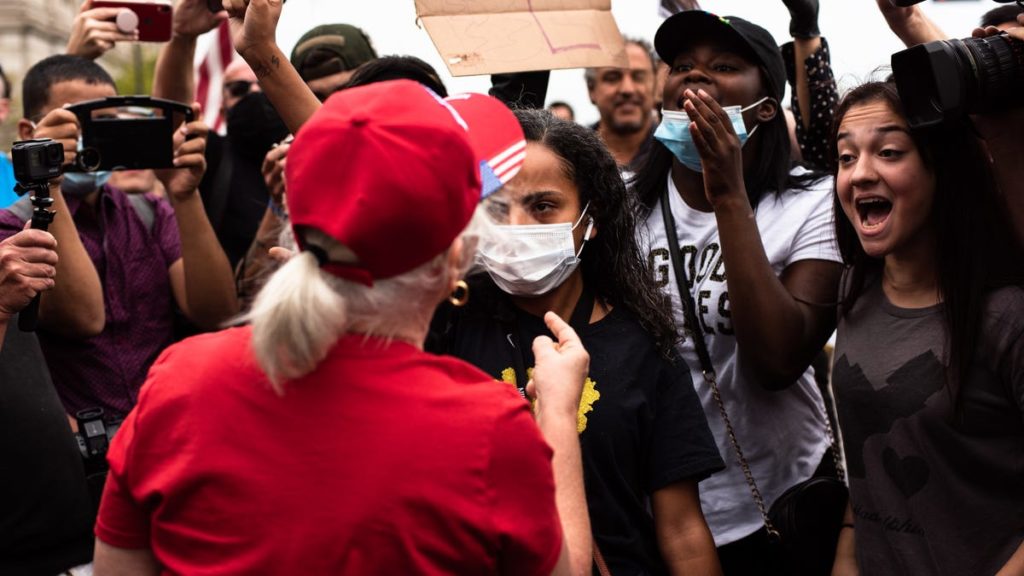4 questions to change political discourse at work
The last six years have bred an unprecedented level of political divisiveness. Most of us are pining for the good old days when we could have constructive policy discussions with our friends and family. When Congress worked across the aisle, politicians practiced the art of mediating differences, and compromise wasn’t…Read more……


The last six years have bred an unprecedented level of political divisiveness. Most of us are pining for the good old days when we could have constructive policy discussions with our friends and family. When Congress worked across the aisle, politicians practiced the art of mediating differences, and compromise wasn’t a dirty word.
While our two-party democratic system may not be ideal, as Churchill said, “Democracy is the worst form of government, except for all the others that have been tried.” For democracy to survive, political discourse must change. As Congress flounders and the press advances false equivalencies, we, the people, can shift the conversation and vote for politicians who understand the art of mediating differences. And the workplace is primed for progress.
The stories we tell ourselves (and others)
The root of many unproductive and harmful political conversations is a pattern of believing that our stories and opinions are the truth. Yet, each story we hold about ourselves, others, or events is often far from the truth. If we get hooked on a story on social or news media, don’t check sources, or educate ourselves about the subject, we’re part of the problem. We unknowingly promote lies and misinformation about events, which makes it impossible to have a thoughtful and open dialogue.
Facts are the bedrock of a democratic society and ground us in reality. Facts matter in the government, courts, and election booth. In all domains of life, agreeing on the facts is a critical foundation for sane conversations, but it’s missing in politics.
Like facts, if our emotional reactions are stubborn and unchecked, they can get in the way of constructive collaboration. Our fears, anger, love, and compassion reflect the stories we hold dear. Each emotional reaction reflects our stories about right and wrong, good and bad, safe and dangerous, moral and immoral, etc. In disagreeable conversations, our reactive emotional patterns of defending our perspective keep us from seeing other views.
Opinions are messy and confusing and differ from the clarity of facts. They reflect our history, beliefs, prejudices, likes, dislikes, and morals. We identify with them, and in heated conversations, we often blindly defend them at any cost, including our well-being and relationships. Firmly-held opinions are part of the stories that hook us and our egos. Convinced that we’re right and our story is accurate, we enter conversations with a closed fist. We can’t hear, absorb, or consider other perspectives with a closed fist. Listening and collaboration are impossible when multiple people enter a conversation with a closed fist.
4 questions to guide compromise
Four types of conversations and four archetypal questions can guide us toward collaboration and compromise, which move us from judgment to understanding, from knowing to learning, from autopilot to innovation, and from hit-and-run decisions to wisdom.
What desires and wants might be driving your judgment?
Our patterns of judgment rely heavily on what we want to happen, our desires, and, just as importantly, our aversions. When they line up with reality, all is well. However, when what we want and what happens are at odds, we suffer.
What concerns about the future do you have?
Our concerns are the seed of our worries about tomorrow. They project us into an unknown future or keep us up at night, reliving the past.
Are power issues impacting your opinion?
Issues of authority are hidden minefields, from the dinner table to the boardroom. You judge different people depending on the power you unconsciously assign to their voice. For example, you might disagree with a friend you adore in a fun and amicable way while judging a colleague in a gossipy and harmful way.
What standards might be driving your judgments?
Many of our critical judgments of others reflect our standards. We unconsciously adopt from our family and culture most of the standards we hold. They are essential to navigating the world and can serve us well. But they are also the root of dogma and disagreements.
These archetypal questions help us to humbly and vulnerably open our hands to reveal our thinking. Then, in any conversation, political or otherwise, we can invite others to do the same. As unnerving as the current political climate is, we—including congresspersons and senators—can do our part to reverse trends by being more mindful of how we engage in conversations. Practicing conscious conversations by cultivating humility, tolerance, and mindful listening will keep us sane and move the country toward a wiser, more tolerant future.
Chuck Wisner is a leadership advisor and author of The Art of Conscious Conversations: Transforming How We Talk, Listen, and Interact.